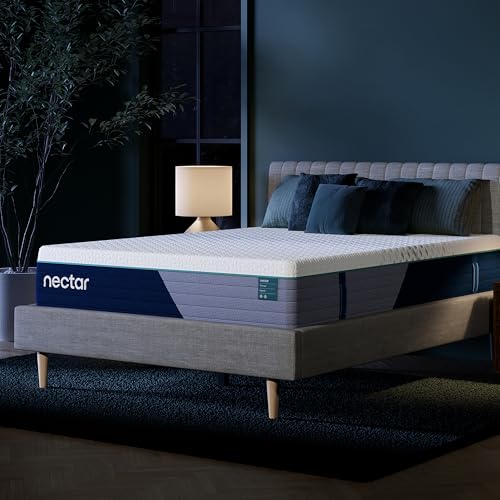Disclosure
This website is a participant in the Amazon Services LLC Associates Program, an affiliate advertising program designed to provide a means for us to earn fees by linking to Amazon.com and affiliated sites.
Introduction
If you’re struggling with shoulder pain, choosing the right mattress firmness—firm or soft—can make a significant difference in your comfort and recovery. The quick answer: a medium to soft mattress is often better for shoulder pain, especially if you sleep on your side, because it cushions the shoulder joint and relieves pressure buildup.
Shoulder pain can turn peaceful nights into restless battles. Whether it’s due to arthritis, injury, or poor posture, an unsupportive mattress can worsen the problem. A mattress that’s too firm may force the shoulder into awkward angles, while one that’s too soft may not align your spine correctly. Striking the right balance is key.
Best Mattresses for Shoulder Pain Relief
If you’re searching for the best mattress to relieve shoulder pain, look no further than these top three expert-recommended options. Each is designed to reduce pressure points, align the spine, and promote restful, pain-free sleep—especially for side sleepers or those with chronic discomfort.
1. Nectar Classic Mattress
- SIMPLE TO SET UP – Just move the box to the room you want to use it in, unbox…
- THE NECTAR SLEEP SYSTEM – Introducing our signature combination of fabrics and…
- HYBRID MOTION ISOLATION LAYER – Individually-wrapped innerspring coils deliver…
- Why we picked it: Combines plush cushioning with responsive coils, offering excellent pressure relief for shoulders while maintaining overall spinal alignment.
2. Nectar Premier Hybrid Mattress
- SIMPLE TO SET UP – Just move the box to the room you want to use it in, unbox…
- 60% MORE COOLING – Step up from our Classic model with even more cooling fibers…
- 2X MORE PRESSURE RELIEF – With an extra inch of contouring memory foam than our…
- Why we picked it: Features multiple layers of body-contouring memory foam that cradle the shoulder area while reducing motion transfer—ideal for side sleepers.
3. Helix Midnight Luxe
- PERSONALIZED SUPPORT: 3 select foam layers provide tailored pressure relief and…
- BREATHABLE: TENCEL premium quilted pillow top for extra comfort designed to…
- ENHANCED COMFORT: Up to 1,000 individually wrapped steel coils with targeted…
- Why we picked it: Specifically engineered for side sleepers, this hybrid mattress uses zoned lumbar support and memory foam to reduce shoulder pain and keep the spine in a neutral position.
Understanding Shoulder Pain and Sleep Position
Shoulder pain and poor sleep often go hand-in-hand, and your sleep position plays a major role in how much pressure your shoulder endures overnight. Knowing how positioning impacts your body can help you choose the right mattress firmness and ultimately reduce discomfort.
How Sleep Positions Affect Shoulder Pain:
- Side Sleepers:
This group is most likely to experience shoulder pain, especially if the mattress is too firm. A rigid surface compresses the shoulder joint, cutting off circulation and straining the rotator cuff. - Back Sleepers:
Generally fare better, but an overly soft mattress can let the shoulder blades sink too deeply, affecting posture and causing misalignment. - Stomach Sleepers:
This position places strain on the neck and shoulders. It’s not recommended for anyone dealing with chronic shoulder issues.
The Connection Between Pressure Points and Firmness:
When your mattress doesn’t allow for gentle contouring—especially around the shoulders and hips—pressure points form, leading to pain, inflammation, or even numbness.
A mattress that offers the right combination of contouring and support allows the shoulder to:
- Sink just enough to relieve pressure
- Stay aligned with the spine
- Maintain a neutral, tension-free posture throughout the night
What to Avoid:
- Ultra-firm mattresses that feel “unyielding”
- Worn-out mattresses with uneven support
- Excessively soft beds that cause sagging under your shoulder
Firm vs. Soft Mattress: Which Is Better for Shoulder Pain?
Choosing between a firm or soft mattress for shoulder pain depends largely on your body type, sleeping position, and personal comfort preferences. Both firmness levels have pros and cons, but understanding how they impact your shoulders can guide you to the best choice.
Benefits of a Firm Mattress:
- Provides excellent spinal support, keeping your body aligned.
- Prevents your body from sinking too deeply, which can help those with back pain or heavier body weight.
- Helps maintain an overall neutral posture during sleep.
However, for shoulder pain sufferers, a firm mattress can cause:
- Increased pressure on the shoulder joint, especially if you sleep on your side.
- Stiffness or numbness due to lack of cushioning around sensitive areas.
Benefits of a Soft Mattress:
- Offers better pressure relief by contouring to your shoulder and body curves.
- Reduces the risk of pain by absorbing impact on bony areas like the shoulders.
- Ideal for side sleepers who need extra cushion for their shoulders and hips.
The downside is that:
- Very soft mattresses can cause your body to sink too much, leading to poor spinal alignment.
- May lack the support necessary for heavier individuals or those who sleep on their back.
What Experts Recommend:
- For shoulder pain, a medium-soft to medium-firm mattress is often the sweet spot.
- This firmness level combines contouring comfort with enough support to maintain healthy spinal alignment.
- Mattresses with zoned support or memory foam layers are especially effective.
How to Choose the Right Mattress Firmness for Your Shoulder Pain
Selecting the ideal mattress firmness for shoulder pain requires a thoughtful approach. The goal is to find a balance between pressure relief and support that suits your body and sleeping habits.
Key Factors to Consider:
- Sleep Position:
- Side sleepers benefit from softer mattresses that cushion the shoulders and hips.
- Back sleepers often need firmer support to maintain spinal alignment.
- Stomach sleepers may require a medium-firm mattress to avoid excessive sinking.
- Body Weight:
- Heavier individuals usually need firmer mattresses to prevent sinking too deeply.
- Lighter sleepers can often enjoy softer mattresses that provide better contouring.
- Pain Location and Severity:
- If your shoulder pain is severe or accompanied by inflammation, prioritize pressure relief with softer surfaces.
- Chronic stiffness might require firmer support to improve posture and reduce muscle strain.
- Material Type:
- Memory foam molds to your body shape, offering excellent pressure relief.
- Latex provides responsive support and durability, balancing softness and firmness.
- Hybrid mattresses combine coils with foam layers for targeted support and comfort.
Steps to Pick Your Mattress:
- Test different firmness levels in-store or through sleep trials.
- Focus on how your shoulders feel after lying down for 10-15 minutes.
- Use pillows strategically to relieve pressure and enhance alignment.
- Consider mattresses with zoned support designed for shoulder and hip relief.
- Read customer reviews, especially from those with shoulder pain.
Tips to Reduce Shoulder Pain While Sleeping
Managing shoulder pain during sleep isn’t just about mattress choice—small adjustments in your sleeping habits and environment can significantly improve your comfort and reduce pain.
Practical Tips to Ease Shoulder Pain:
- Choose the Right Sleep Position:
- Sleep on your opposite side to avoid aggravating the painful shoulder.
- If you prefer side sleeping, use a soft mattress that cushions your shoulder.
- Avoid sleeping on your stomach, which strains shoulders and neck.
- Use Supportive Pillows:
- Place a thin pillow under your affected shoulder to reduce pressure.
- Use a contoured cervical pillow to support neck alignment.
- Hug a pillow in front of your body to stabilize your shoulder and reduce rolling onto it.
- Practice Good Posture During the Day:
- Maintain proper posture to prevent shoulder strain that can carry over into the night.
- Incorporate shoulder stretches and strengthening exercises to reduce stiffness.
- Adjust Your Mattress Setup:
- Add a memory foam topper to soften a too-firm mattress.
- Replace your mattress if it’s old or sagging, as uneven surfaces worsen shoulder pain.
- Keep Your Shoulder Warm:
- Use a heating pad or warm compress before bed to relax muscles.
- Avoid sleeping in cold environments that can stiffen joints.
Conclusion
Choosing the right mattress firmness is crucial in managing shoulder pain and achieving restful sleep. While firm mattresses offer strong support, they may increase pressure on the shoulder joint. Softer mattresses provide better cushioning but might lack sufficient support for spinal alignment. The ideal choice is typically a medium-soft to medium-firm mattress that balances comfort and support, especially for side sleepers.
Key takeaways:
- Understand your sleep position and body weight when selecting firmness.
- Prioritize pressure relief around your shoulders without sacrificing overall support.
- Consider mattress materials like memory foam or hybrid designs for added comfort.
- Combine mattress choice with sleep position adjustments and supportive pillows for best results.
Frequently Asked Questions About Mattress Firmness and Shoulder Pain
Can a mattress really affect shoulder pain?
Yes, mattress firmness and support directly impact how pressure is distributed across your shoulders during sleep. A mattress that’s too firm can create pressure points, worsening pain, while one too soft can lead to poor spinal alignment and muscle strain.
Is memory foam good for shoulder pain?
Memory foam is often recommended because it contours to the body, reducing pressure on sensitive areas like the shoulders. It helps maintain proper spinal alignment by allowing the shoulders to sink slightly without sagging.
Should I choose a firm or soft mattress if I sleep on my side?
Side sleepers typically benefit from a softer to medium-soft mattress that cushions the shoulders and hips. This prevents pressure buildup and helps maintain a neutral spine position.
How often should I replace my mattress if I have shoulder pain?
Mattresses generally last 7-10 years, but if you notice sagging, lumps, or increased pain, it may be time to replace it sooner. An old mattress often loses support, aggravating shoulder discomfort.
Can pillows help reduce shoulder pain?
Absolutely. Using supportive pillows that keep your neck and shoulders aligned can relieve pressure and improve comfort. Positioning a pillow under or between your shoulders can also help.



